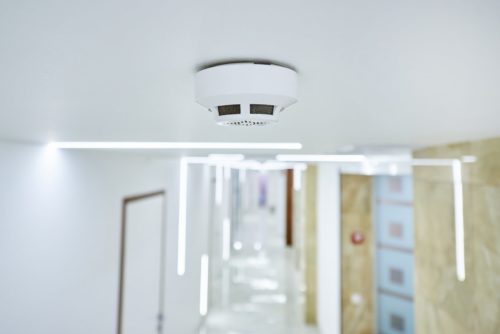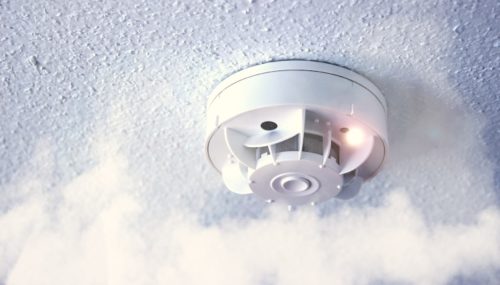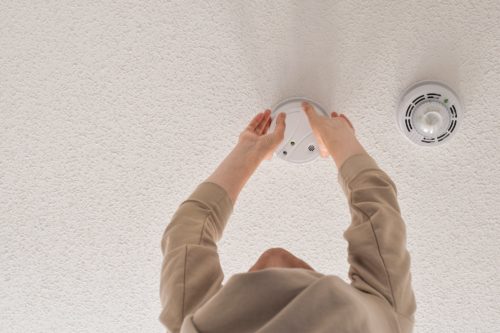Fire detection and warning systems are a critical component of any building’s safety infrastructure, providing early alerts that help protect lives and prevent extensive property damage.
Whether in a commercial or residential setting, these systems are designed to detect fire hazards at the earliest possible stage, giving occupants time to evacuate safely and emergency responders the opportunity to act quickly.
In the UK, businesses and property owners have a legal responsibility to ensure that fire alarms and detection systems are fully operational at all times.
Under the Regulatory Reform (Fire Safety) Order 2005, all fire detection and warning systems must be properly maintained, regularly tested, and compliant with fire safety standards to reduce the risk of fire-related incidents.
Failing to meet these obligations can result in significant fines and legal repercussions, not to mention the potential loss of life or property damage.
At BES Security, we specialise in the installation, maintenance, and inspection of fire detection and alarm systems, ensuring that businesses and homeowners stay compliant with regulations while keeping their properties safe.
In this guide, we’ll outline how often fire detection and warning systems should be checked, what the legal requirements are, and how to maintain these systems for maximum efficiency.

What Are Fire Detection and Warning Systems?
Fire detection and warning systems are designed to detect signs of fire—such as smoke, heat, or carbon monoxide—and alert occupants before the situation escalates.
These systems play a crucial role in fire prevention, early detection, and emergency response, ensuring that people can evacuate safely while minimising damage to property.
A well-functioning fire detection system typically consists of several key components:
- Smoke Detectors – These sensors identify smoke particles in the air and trigger an alarm to warn occupants.
- Heat Detectors – These activate when a significant temperature increase is detected, making them ideal for environments like kitchens where smoke detectors might trigger false alarms.
- Fire Alarms – These devices emit loud, audible warnings when a fire is detected, alerting everyone within the building.
- Emergency Lighting – Designed to illuminate escape routes during power failures, ensuring safe evacuation in low-visibility conditions.
Each of these elements plays a vital role in fire safety, and regular maintenance ensures they function correctly when needed most.
Why Regular Fire Alarm Checks Are Essential
Routine fire alarm testing and maintenance are crucial to ensuring the reliability of a fire detection system.
A poorly maintained system may fail to detect a fire in time, leaving occupants vulnerable and increasing the likelihood of severe damage or casualties.
Neglecting fire alarm maintenance can lead to:
- System malfunctions – Dust, dirt, or faulty wiring can prevent alarms from triggering when needed.
- False alarms – Without regular checks, a system may activate unnecessarily, leading to disruptions and desensitisation to real threats.
- Non-compliance with fire safety laws – UK regulations mandate that fire detection systems are regularly inspected, and failure to do so can result in fines, legal penalties, or even business closure.
- Increased fire hazards – Without early detection, fires can spread rapidly, endangering lives and property.
Under the Regulatory Reform (Fire Safety) Order 2005, it is the duty of employers, building owners, and property managers to ensure fire safety equipment is tested and maintained.
This regulation requires that fire detection systems be routinely checked and professionally inspected at regular intervals to guarantee their effectiveness.
At BES Security, we provide comprehensive fire alarm testing and maintenance services, helping businesses and property owners remain compliant while ensuring their systems are fully functional.
Whether you need weekly checks, annual inspections, or emergency repairs, our team ensures that your fire detection system remains in top working condition.

How Often Should Fire Detection and Warning Systems Be Checked?
Weekly Fire Alarm Testing
Regular testing is essential to ensure fire alarms function properly in an emergency.
UK fire safety regulations recommend that businesses conduct weekly fire alarm tests to confirm all systems are operational.
One of the most effective methods for testing is Manual Call Point (MCP) activation, where a different call point is tested each week in rotation.
This process ensures that every alarm in the system is functioning correctly over time without causing significant disruption.
In addition to MCP tests, businesses should conduct audible alarm tests to check:
- Whether the alarm can be clearly heard throughout the premises.
- Any sound level inconsistencies that may require system adjustments.
- If occupants understand the alarm signal and respond appropriately.
Regular weekly testing not only ensures compliance but also familiarises employees with the sound of the alarm, helping them react quickly in the event of a real fire.
Monthly Fire System Checks
Beyond weekly alarm tests, businesses should perform monthly fire system checks to ensure all supporting safety measures remain operational. These include:
- Emergency Lighting – Emergency lights must function correctly in case of a power failure, ensuring that escape routes remain visible. A visual inspection and functional test should be conducted monthly.
- Automatic Fire Detection Systems – Smoke and heat detectors should be checked to confirm they respond correctly when tested. Dust buildup, environmental factors, or electrical faults can sometimes impact their sensitivity.
By conducting these additional checks, businesses can identify and resolve minor issues before they become serious safety risks.
Quarterly and Biannual Fire Alarm Inspections
Professional inspections should be carried out every three to six months by a certified fire safety provider, such as BES Security.
These inspections go beyond standard testing and involve a thorough review of system functionality, identifying faults that may not be visible during routine checks.
During a quarterly or biannual fire alarm inspection, specialists will:
- Test and replace batteries to ensure backup power reliability.
- Inspect fire alarm control panels for faults or errors.
- Check communication links between alarms and monitoring systems.
- Ensure all detectors remain unobstructed and correctly positioned.
Scheduled professional inspections help businesses stay compliant with British Standard BS 5839-1:2017, which outlines best practices for fire alarm maintenance.

Annual Fire Alarm System Inspection and Servicing
UK fire safety regulations require businesses to have a full fire alarm system inspection and service at least once per year.
This is essential for meeting BS 5839-1:2017 standards and ensuring long-term system reliability.
A comprehensive annual fire alarm inspection should include:
- Functional testing of all smoke detectors, heat sensors, and call points.
- Review of system logs, checking for any past faults, false alarms, or recorded incidents.
- A full system reset and performance report, ensuring compliance with fire safety laws.
At BES Security, we provide professional fire alarm servicing to keep businesses compliant, prevent system failures, and ensure all fire detection and warning systems operate at peak efficiency.
Fire Alarm System Maintenance Best Practices
Keeping a Fire Alarm Maintenance Log
Under UK law, businesses are required to maintain a fire alarm logbook to track system performance and identify any recurring faults.
This document serves as a record of all testing and maintenance activities, ensuring compliance with fire safety regulations.
A fire alarm log should include:
- Details of all weekly, monthly, and annual tests.
- Dates and findings of professional inspections.
- Notes on any faults identified and corrective actions taken.
By keeping a detailed maintenance log, businesses can demonstrate due diligence in fire safety compliance and quickly identify any recurring system issues.
Identifying and Reporting Fire Alarm Faults
Recognising potential fire alarm system faults early can prevent critical failures in an emergency. Some common warning signs include:
- Low battery warnings, which can indicate backup power failure.
- Frequent false alarms, often caused by sensor contamination or environmental factors.
- Failure to sound during tests, which could signal electrical or mechanical issues.
If any of these issues occur, businesses should immediately contact a fire safety professional to diagnose and resolve the problem.
BES Security offers emergency fire alarm repairs and maintenance, ensuring businesses remain compliant and protected at all times.
Fire Alarm Inspection and Testing FAQs
How often should fire detection and warning systems be checked?
Fire detection and warning systems should be tested weekly, inspected monthly, and professionally serviced at least once a year.
Quarterly or biannual professional inspections are also recommended to maintain compliance with BS 5839-1:2017.
How often should you check your fire alarm at home?
Homeowners should test their smoke alarms monthly by pressing the test button to ensure they produce an audible alert. Batteries should be replaced annually, and entire units should be replaced every 10 years.
How often should an audible fire alarm be tested?
Audible fire alarms should be tested every week to confirm that they can be heard clearly throughout the premises.
This is particularly important in large buildings where alarm sound levels may vary.
Who is responsible for fire alarm inspections in a business?
The Regulatory Reform (Fire Safety) Order 2005 places responsibility on business owners, landlords, and facility managers to ensure fire alarm systems are maintained.
A designated Responsible Person should be appointed to oversee compliance with fire safety regulations.
What happens if my fire alarm fails an inspection?
If a fire alarm system fails an inspection, the issues must be addressed immediately to maintain compliance. Common corrective actions include:
- Replacing faulty components, such as sensors or backup batteries.
- Reconfiguring system settings to resolve false alarm issues.
- Upgrading outdated systems to meet modern safety standards.
At BES Security, we offer comprehensive fire alarm servicing and upgrades. This ensures businesses remain protected and compliant with UK fire safety laws.


